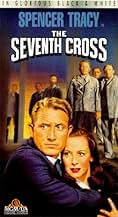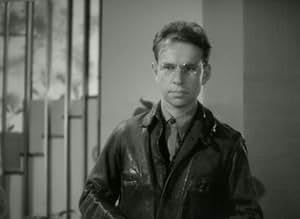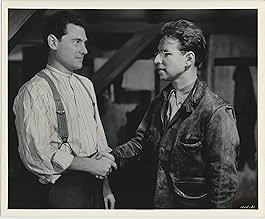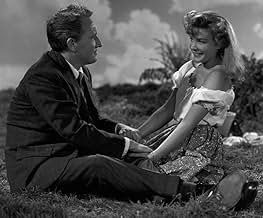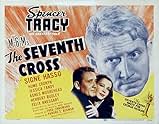CALIFICACIÓN DE IMDb
7.4/10
3.2 k
TU CALIFICACIÓN
En los años previos a la Segunda Guerra Mundial, siete prisioneros consiguen escapar de un campo de concentración nazi. El comandante del campo ordena que se claven siete cruces en siete árb... Leer todoEn los años previos a la Segunda Guerra Mundial, siete prisioneros consiguen escapar de un campo de concentración nazi. El comandante del campo ordena que se claven siete cruces en siete árboles para enterrarlos cuando sean capturados.En los años previos a la Segunda Guerra Mundial, siete prisioneros consiguen escapar de un campo de concentración nazi. El comandante del campo ordena que se claven siete cruces en siete árboles para enterrarlos cuando sean capturados.
- Nominado a 1 premio Óscar
- 3 premios ganados y 1 nominación en total
- Dirección
- Guionistas
- Todo el elenco y el equipo
- Producción, taquilla y más en IMDbPro
Opiniones destacadas
This film stars Spencer Tracy as a concentration camp escapee named George Heisler who navigates his way to freedom through the perils of Nazi Germany. Along the way he meets many people who help him, and his cynicism and fatigue fade away. Early in the story, soon after he's left the camp, he meets a little girl, and in his mind he's sure that he'll kill her if she attracts the wrong kind of attention to him. Next he lurches into the home of his ex-girlfriend, frightening her. And no wonder, because his face has a twisted expression on it that frightened ME - in this moment Tracy is almost unrecognizable. This man's an animal, he's been through hell and he has no reason to believe that the world is anything other than a sewer. For my money this is a pretty startling opening for a 1944 movie.
Not to throw definitions around too freely, I'm tempted to describe this film as Nazi noir. Heisler weaves his way through German society of 1936, where it's the criminals who are in power, and scuttling through the streets are the folks who are merely trying to survive, in any way possible. At the back of our minds is the worrisome knowledge that things are going to get exponentially worse. Fred Zinnemann, the director, creates an atmosphere of claustrophobia and palpable dread where the night is filled with dark shadows and any tiny act of resistance to the Nazi regime is a colossal act of courage. There is almost no violence in the film, yet the threat of violence hangs heavy in the air. Hume Cronyn and Jessica Tandy play Paul and Liesel Roeder, a couple who are old friends of Heisler and who befriend him. Paul is politically neutral. He doesn't follow the news, and one gets the feeling that he would rather not know anything about what's going on. One of the fascinating threads in the film is his growing awareness. The scenes with Cronyn and Tandy are wonderful - real chemistry is bubbling here and they seem to belong together (and we all know what happened in real life). I must mention that George Macready and Agnes Moorehead are very good in small roles. There's considerable art and intelligence in "The Seventh Cross", and a preview of what was to come in Zinnemann's illustrious career.
Not to throw definitions around too freely, I'm tempted to describe this film as Nazi noir. Heisler weaves his way through German society of 1936, where it's the criminals who are in power, and scuttling through the streets are the folks who are merely trying to survive, in any way possible. At the back of our minds is the worrisome knowledge that things are going to get exponentially worse. Fred Zinnemann, the director, creates an atmosphere of claustrophobia and palpable dread where the night is filled with dark shadows and any tiny act of resistance to the Nazi regime is a colossal act of courage. There is almost no violence in the film, yet the threat of violence hangs heavy in the air. Hume Cronyn and Jessica Tandy play Paul and Liesel Roeder, a couple who are old friends of Heisler and who befriend him. Paul is politically neutral. He doesn't follow the news, and one gets the feeling that he would rather not know anything about what's going on. One of the fascinating threads in the film is his growing awareness. The scenes with Cronyn and Tandy are wonderful - real chemistry is bubbling here and they seem to belong together (and we all know what happened in real life). I must mention that George Macready and Agnes Moorehead are very good in small roles. There's considerable art and intelligence in "The Seventh Cross", and a preview of what was to come in Zinnemann's illustrious career.
A truly outstanding film that has not received the distinction that it deserves, despite a first-rate cast and compelling, as well as unique for the time, subject matter.
Spencer Tracy plays George Heisler, one of seven prisoners escaping from a German concentration camp in 1936. The film traces his attempt to establish contact with the German resistance movement, and along the way he changes slowly from a hardened cynic, and regains his faith in mankind.
This is not a bang-bang action movie. The lack of overt violence is what makes gives the film a searing authenticity. This is based on a novel by Anna Seghers, whose husband was indeed imprisoned in a concentration camp. True, people knowledgeable about the era will find many technical errors. For one thing, all of the actors, including especially Tracy and Ray Collins, are simply too overfed to be believable concentration camp inmates. Also the film shows the SA running the camp, when I do believe the SS was running the camps by '36. I was not especially happy with the handling of the single Jewish character, who is a token character and not portrayed very favorably.
But this was 1944, not 1994, and this was the first film from Hollywood to depict concentration camps. Also I can't think of very many films that have more successfully captured the terror and despair of Nazi Germany, and also more clearly impart a moral message. In that regard it is very faithful to the book.
The performances by all, even the bit characters, are superlative. This was one of Spencer Tracy's finest roles, and supposedly the melancholy of his performance was to a large extent influenced by word that a young friend, who he knew from Boy's Town, had died in combat.
Cronyn and Tandy play Liesl and Paul Roeder, who try to help George Heisler. What makes this a very fine drama is how even secondary and bit characters are shown to change and evolve. Watch for Helene Weigel, wife of Bertold Brecht, playing an old female janitor watching Roeder being taken away in a car. Weigel was the inspiration for Brecht's Mother Courage.
Seghers was a Communist, as are the major characters of the book, and the politics of the author simmers below the surface without being explicitly expressed. Look closely at the characters playing Nazis and concentration camp guards, and generally most of the characters with accents. The majority are refugees from Nazi Germany, adding great authenticity to their performances.
Spencer Tracy plays George Heisler, one of seven prisoners escaping from a German concentration camp in 1936. The film traces his attempt to establish contact with the German resistance movement, and along the way he changes slowly from a hardened cynic, and regains his faith in mankind.
This is not a bang-bang action movie. The lack of overt violence is what makes gives the film a searing authenticity. This is based on a novel by Anna Seghers, whose husband was indeed imprisoned in a concentration camp. True, people knowledgeable about the era will find many technical errors. For one thing, all of the actors, including especially Tracy and Ray Collins, are simply too overfed to be believable concentration camp inmates. Also the film shows the SA running the camp, when I do believe the SS was running the camps by '36. I was not especially happy with the handling of the single Jewish character, who is a token character and not portrayed very favorably.
But this was 1944, not 1994, and this was the first film from Hollywood to depict concentration camps. Also I can't think of very many films that have more successfully captured the terror and despair of Nazi Germany, and also more clearly impart a moral message. In that regard it is very faithful to the book.
The performances by all, even the bit characters, are superlative. This was one of Spencer Tracy's finest roles, and supposedly the melancholy of his performance was to a large extent influenced by word that a young friend, who he knew from Boy's Town, had died in combat.
Cronyn and Tandy play Liesl and Paul Roeder, who try to help George Heisler. What makes this a very fine drama is how even secondary and bit characters are shown to change and evolve. Watch for Helene Weigel, wife of Bertold Brecht, playing an old female janitor watching Roeder being taken away in a car. Weigel was the inspiration for Brecht's Mother Courage.
Seghers was a Communist, as are the major characters of the book, and the politics of the author simmers below the surface without being explicitly expressed. Look closely at the characters playing Nazis and concentration camp guards, and generally most of the characters with accents. The majority are refugees from Nazi Germany, adding great authenticity to their performances.
Seven prisoners escape from a German concentration camp, and the Nazi commander vows to capture and crucify all of them. One by one they are captured in some harrowing scenes and put up on the crosses outside the camp. The seventh cross, already placed, awaits the final escapee - played by a desperate Spencer Tracy. The fear and claustrophobia of being trapped, even as an escapee, inside Nazi Germany is easily seen through Tracy's able eyes. Most notable is the German couple that eventually aids Tracy despite their fear; they are played touchingly by the famous husband and wife team of Hume Cronyn and Jessica Tandy, two of the great actors of our age. Signe Hasso plays a lovely but lonely maid with whom Tracy and she have a touching emotional connection. The hope symbolized by the couple and the maid within the darkness of Nazi Germany is at the core of the film. The issue of Tracy's escape - or non-escape - is almost irrelevant by then: the glimmer of humanity is seen even among the German people. Despite the apparent pessimism of the film, it is optimistic at its heart. And it is charming and beautifully done. Not to be missed.
I familiar with Zinnemann's last five movies and am a great fan of his last one "Five days one summer", which has received more undeserving brickbats than bouquets from some wellknown critics. It is evident to me that Zinnemann was more 'sinned against than sinning.' After seeing "The Seventh Cross", I am convinced that this man was never given given his due recognition because he was so different from his peers.
The story of "The Seventh Cross" is narrated by a dead man. For us in the current decade having seen films like "The Others" such a script as this one is not uncommon. But in the Forties, this must have been groundbreaking.
The casting is superb. Spencer Tracy is fascinating and a superb choice. This is one of his finest performances--because he does not speak much--just like "Bad Day at Black Rock."
Agnes Moorehead appears for a few minutes but presents a delightful character that adds to the strength of the film. I thought Russ Tamblyn was the acrobat who does not speak a single line but the IMDb records indicate that I am mistaken. Was I? Hume Cronyn and Jessica Tandy were a delight to watch as always. The character of Signe Hasso (Toni) is probably the least appropriate character in the film but one guesses that necessity for a love interest for the lead character in a film like this.
For me the actors played a major part in making the film a wonderful viewing experience. But the real contributors to making the work impressive were Zinnemann and the cinematographer Karl Freund. The opening sequence showing the faces of the escapees establish the credibility of the two gentlemen behind the camera. The camerawork of Freund is always interesting but this film shows the chemistry between director and cinematographer.
Zinnemann's choice of subjects to film has always made me wonder about the man. It is evident that he was a very sensitive person who valued great ideals. He was probably heartbroken that his last film was not accepted as much as his other work based on popular novels and plays.
The story of "The Seventh Cross" is narrated by a dead man. For us in the current decade having seen films like "The Others" such a script as this one is not uncommon. But in the Forties, this must have been groundbreaking.
The casting is superb. Spencer Tracy is fascinating and a superb choice. This is one of his finest performances--because he does not speak much--just like "Bad Day at Black Rock."
Agnes Moorehead appears for a few minutes but presents a delightful character that adds to the strength of the film. I thought Russ Tamblyn was the acrobat who does not speak a single line but the IMDb records indicate that I am mistaken. Was I? Hume Cronyn and Jessica Tandy were a delight to watch as always. The character of Signe Hasso (Toni) is probably the least appropriate character in the film but one guesses that necessity for a love interest for the lead character in a film like this.
For me the actors played a major part in making the film a wonderful viewing experience. But the real contributors to making the work impressive were Zinnemann and the cinematographer Karl Freund. The opening sequence showing the faces of the escapees establish the credibility of the two gentlemen behind the camera. The camerawork of Freund is always interesting but this film shows the chemistry between director and cinematographer.
Zinnemann's choice of subjects to film has always made me wonder about the man. It is evident that he was a very sensitive person who valued great ideals. He was probably heartbroken that his last film was not accepted as much as his other work based on popular novels and plays.
Although slow moving, as was typical of Hollywood dramas of that era, The Seventh Cross tells a compelling story of the human spirit overcoming the evils of totalitarianism, and the recovery of one's faith in mankind during the midst of a societal distrust. George Heisel, portrayed by Spencer Tracey (one of his classic performances), is a broken man who has lost his faith in humanity who has escaped from a Nazi concentration camp with six others in the early days of the Reich when not all Germans loved the Fuerer and still had decent intentions. The Nazi Commandant vows to capture all seven and hang them on crosses he has built inside the camp. Six are caught, but Heisel escapes to Mainz, leaving the seventh cross empty. In Mainz, he realizes that he can't go to his old girlfriend (who has married a Nazi) or his family (his younger brother has joined the SS); almost all his friends have turned Nazi or been captured or killed save one, Paul Roeder and his wife Liesel (played by longtime married actors Hume Cronyn and Jessica Tandy). The Roeder's help get him in touch with members of the underground (including Paul Guilfolye, father of the actor on CSI) who help him escape to Holland. As he leaves, he realizes he must pay back not those who hurt him and broke him, but those that healed him, those who restored his faith in the God-given decency inherent in all of us if given the chance to rise to the surface. Sometimes it can arise in the most unlikely of places, but it is there.
To be placed alongside The Hiding Place, Schindler's List and Swing Kids. A must see for anyone who loves freedom.
To be placed alongside The Hiding Place, Schindler's List and Swing Kids. A must see for anyone who loves freedom.
¿Sabías que…?
- TriviaFirst joint film appearance of real life couple Hume Cronyn and Jessica Tandy.
- ErroresWhen the escapees are being hunted, the only uniformed personnel we see chasing them are the 'Storm troopers' (Sturmabteilung) or SA. Even before the 'night of the Long Knives', the SA would not have been the only group to search for escapees & by 1936, the hunt would also have been carried out by the regular police and the Schutzstaffel (SS).
- Citas
George Heisler: There are no better men than Paul Roeder.
- Versiones alternativasThere is an Italian edition of this film on DVD, distributed by DNA srl, "LA SETTIMA CROCE (1944) + THE SEARCH (Odissea tragica, 1948)" (2 Films on a single DVD), re-edited with the contribution of film historian Riccardo Cusin. This version is also available for streaming on some platforms.
- ConexionesFeatured in Twenty Years After (1944)
Selecciones populares
Inicia sesión para calificar y agrega a la lista de videos para obtener recomendaciones personalizadas
- How long is The Seventh Cross?Con tecnología de Alexa
Detalles
Taquilla
- Presupuesto
- USD 1,300,000 (estimado)
- Tiempo de ejecución1 hora 52 minutos
- Color
- Relación de aspecto
- 1.37 : 1
Contribuir a esta página
Sugiere una edición o agrega el contenido que falta

Principales brechas de datos
By what name was La séptima cruz (1944) officially released in India in English?
Responda

